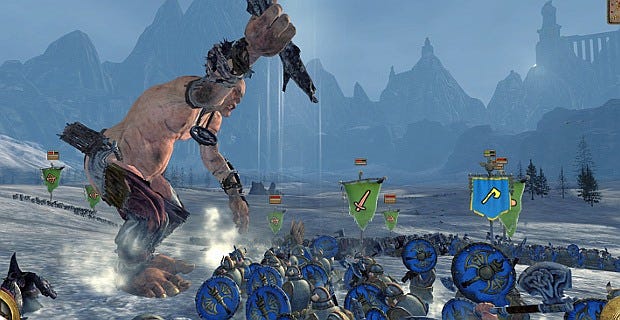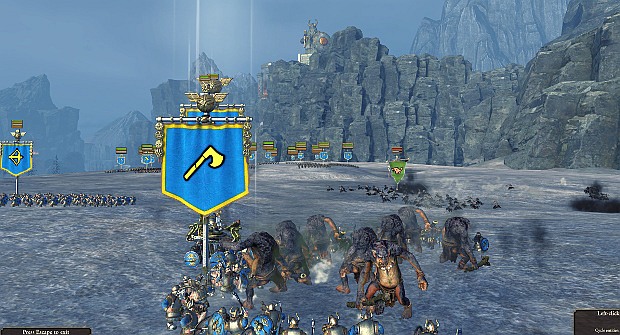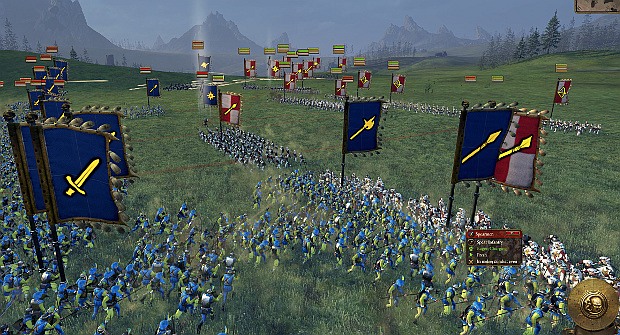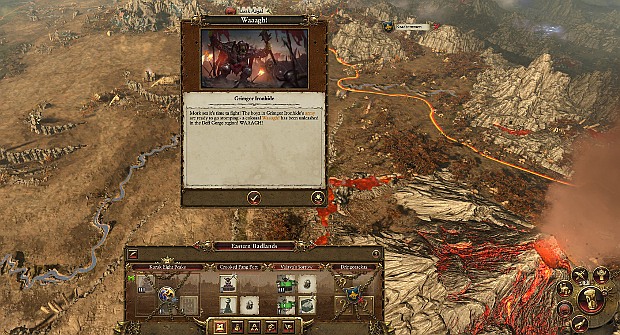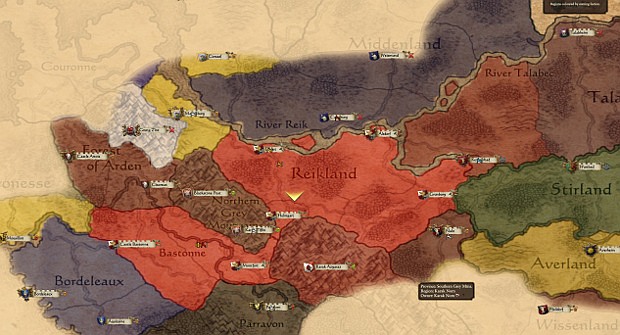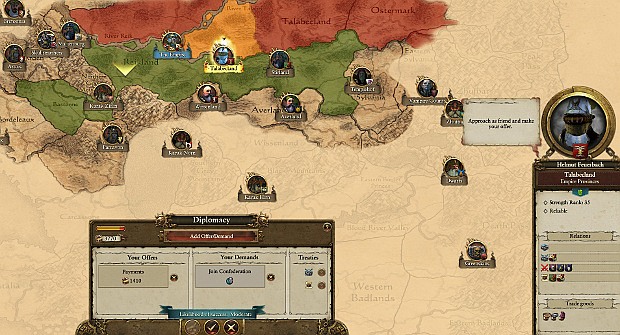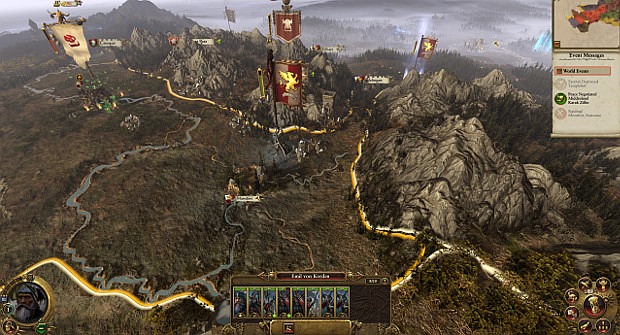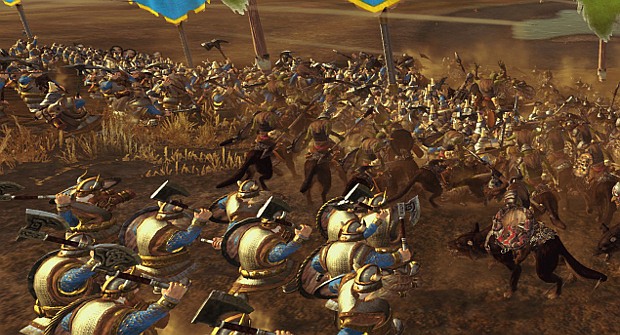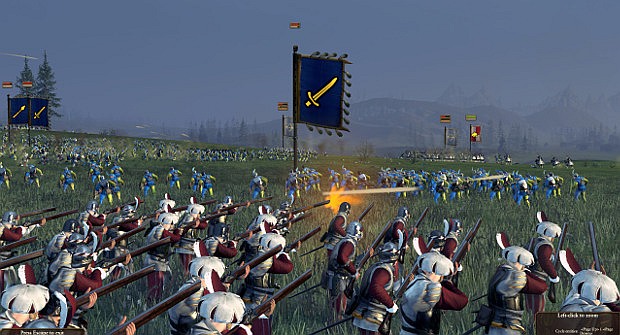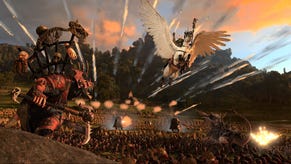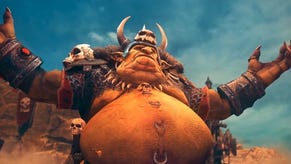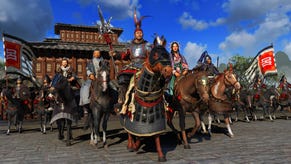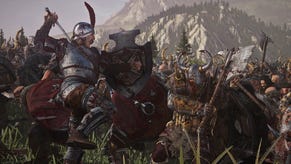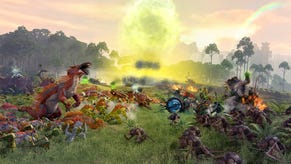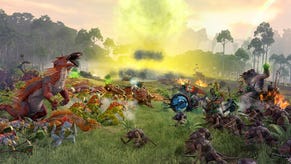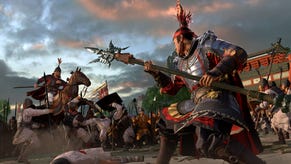Wot I Think: Total War: Warhammer
A good Warhammer game
Watching the Greenskins approach from a dusty brown hilltop with the remnants of the High King's great Dwarven army, I knew I was probably going to lose this battle and, with it, the entire Blood River Valley that I'd spent most of my game trying to conquer. I'd already defeated three other Orc armies in the last two turns, but this made one unstoppable horde too many. Hours of effort and progress were about to be erased as my greatest army was swamped by the seemingly endless tide of Greenskins.
I was thrilled: this kind of heroic, doomed slaughter is what I signed up for with Total War: Warhammer.
The Warhammer license liberates Total War from the burden of plausibility that it has so uncomfortably shouldered throughout its history. It's a game of titanic clashes at the gates of ancient capitals, and wars of pride between two enemies with nothing at stake but a moral point. Every other battle is a Battle of Dimrill Dale, The Fist of First Men, or any other legendary, improbable fantasy clash between heroes and their armies. Total War: Warhammer (Total Warhammer from this point forward, as it is both a better title and a more accurate one) always feels like its source material: turned-up to eleven, about to snap under the weight of its own absurdity, but carried along by sheer enthusiastic conviction.
Battles like this have sometimes been hard to find in previous Total War games, where I'd find myself auto-resolving all but the most closely-matched battles in order to focus on my strategic designs. But here, in my week or so with the game, I've fought at least a half-dozen of the most thematically satisfying battles I've ever played in Total War.
Total Warhammer encourages these battlefield heroics, battles that don't follow the logic of a military tactics manual but instead satisfy the narrative of a fantasy game. Greenskin tides rolling across a battlefield, breaking against walls of armor-laden Dwarves bent on avenging past defeats. Heavily armored Imperial knights go tearing through dense thickets of undead infantry. Hero units plunge into the fray, sometimes wiping out entire regiments with a few swings of a magical axe.
Stuff like this is why I decided to fight this last, hopeless battle with my beleaguered Dwarven army. The outcome was practically written in stone, and in any other Total War I'd have cut my losses and moved on. But not only did I feel like I owed this army something for beating 3:1 and 4:1 odds in the last couple battles, but I was also starting to think that maybe they could pull this off. That the High King and his stubborn Longbeards could notch another win.
There were other factors tipping the scales in my favor. Total Warhammer is a game of exaggeration. Your generals and soldiers will level-up as they always have, but now each general and hero has distinct leadership tracks that have very different impacts on their role. They can be behind-the-lines inspirations, legends of hand-to-hand combat, or strategic-level administrators. Sometimes all three, if they last long enough. And those bonuses can stack in some wild ways: my Dwarven king gave his melee troops a 12% bonus to both attack and defense… as well as a massive bonus when fighting Greenskins. When all the bonuses were factored in, each Dwarven soldier was hitting those Orcs for almost double their normal striking power. In no time at all, with a little seasoning under each army's belt, there is no such thing as a "normal" Total Warhammer battle. Every skirmish becomes a clash of the titans.
It was a fearsome thing to watch, the last stand of the High King's army. Goblin units melted under Dwarven axes. Orc archers were cut down en masse by pinpoint-accurate Dwarven Quarrelers. The piles of corpses were stunning. The Greenskins started to hesitate and waver as my army of fanatical veterans hacked their way through their ranks, and their generals died at the hands of the High King.
Then the Giant Spider reached the battle. An Orc super-unit, the Giant Spider stood 4 times the height of any of my soldiers, and you could fit a regiment underneath its eight legs. Even as the Orcish regulars cut and run, the Spider was impervious to my heroes' axes. It calmly, methodically started flinging Dwarves around the battlefield, stamping them with its legs, and chopping them with its jaws. It was horrifying, a little unfair, and entirely amazing. It single-handedly (eight-leggedly?) won the battle for the Greenskins and drove my forces out of the valley.
With the loss of the valley, my forces retreated into the mountains to lick their wounds and rebuild. It was a time to manage my diminished empire and brace it for another attempt to retake the lost ground once I'd gotten some breathing room.
Not that there's a lot of empire management to do here. Total War: Warhammer keeps the focus squarely on the battlefield by reducing the complexity of the strategic layer. Tax rates? Nope, you tax or you don't, those are your choices. Building chains have more to do with what kind of units you can build than what kind of economy you're creating. While you do build up your forces and expand your holdings, ultimately you're here to annihilate your enemies and resist the intermittent, horde-like invasions coming out of the Chaos Wastes.
What partially saves Total Warhammer from feeling like a shallower version of a Total War game is that the feature cuts are replaced by a series of faction-specific game mechanics that make each race feel wildly different from its rivals. You may not have to manage much of an economy anymore, but you do have to figure out how to keep the Dwarves feeling confident in your leadership by paying-off the grudges they bear other races. Every lost city must be regained. Every victorious enemy general must be humbled. If you don't let revenge steer your strategy as the Dwarves, they'll lose faith in your leadership and create a restive, rebellious atmosphere. Likewise, the Orcs can't stop fighting. Ever. In fact, they're best-served by leaving enemies weak but alive so that they can always have armies satisfying their "Fightiness" (there's an actual meter next to each army's information panel) somewhere rather than having unhappy Orcish armies fighting amongst themselves.
And because your options are more limited on the strategic layer, you really do have to win Total Warhammer on the battlefield. You don't just want a victory, you need a decisive result or conquest becomes impossible. If you let the AI take over and eat 35% casualties, your armies will bleed-out. This is a game where tactics end up driving the strategy, not the other way around. For the most part, that drives a lot of exciting action.
But only up to a point. What keeps me from wholly falling in love with Total Warhammer is my growing sense that it works because Creative Assembly ripped-out most of the strategic guts out of the game and left a facade in their place. For instance, one reason that the stakes for each battle are so high is because it's nearly impossible to field more than one or two good armies in a game. The economy won't allow it. Even deep into my games, the majority of my income came from "background income", which is what Total Warhammer calls your baseline "money from the ether" income. In other words, the actual economy of Total War: Warhammer can't really sustain any of what you see on the campaign map… which also means that expansion simply adds to your vulnerabilities without contributing resources to your war-chest.
Every faction is afflicted by this, it seems. If you pay attention to the diplomacy screen, you'll note HUGE swings in the power rankings of each faction on the map. I couldn't figure it out until I realized that I would become one of the top 3 powers in the game as soon as I had a couple decent standing armies (that were almost crushing me underneath their upkeep costs) and I'd plummet down to 15th or 20th as soon as I suffered major casualties. Small wonder that nothing is ever gained or lost in the Old World: no territory can fund the forces needed to protect it, so each expansion is a brief boom before an inevitable collapse. Like an annoying racing game, Total Warhammer's campaign is rubber-banded so that building a lead is nearly impossible.
And here we come to the limitations of this review: I have enjoyed my time with Total War: Warhammer immensely, but the more I play, the more I have a growing sense that it begins to crumble as its scope expands. The economy is out of whack so there's magical income to compensate for it. The moment you make progress on the campaign map, you draw so much diplomatic aggression from other powers that you are quickly swarmed by enemies that you do not and (thanks to the economy) cannot field the forces to resist.
That does put extra pressure on you to deliver those decisive victories as a general, and it contributes to the intense "win or die" Warhammer flavor of the game… but it also means that those victories start to feel fleeting and illusory because they don't add-up to anything strategically meaningful. What was exciting becomes a slog, and that's especially, painfully true on higher difficulty levels.
None of this diminishes the fact that I've had a wonderful time playing Total War: Warhammer and am far from finished with it. But the more I play, the more convinced I become that this is a game that makes a devil's bargain. It feels exactly the way a Warhammer-themed Total War game should feel, and creates tons of dramatic battles and storylines over the course of each campaign. But to reliably generate all that excitement and tension, it secretly disconnects many of the strategic systems that hold good Total War games together. So do you want a good Warhammer game, or a good Total War game? Because I'm less and less convinced that you'll find both inside Total Warhammer.
Total War: Warhammer is out on May 24th for Windows via Steam and Humble.
